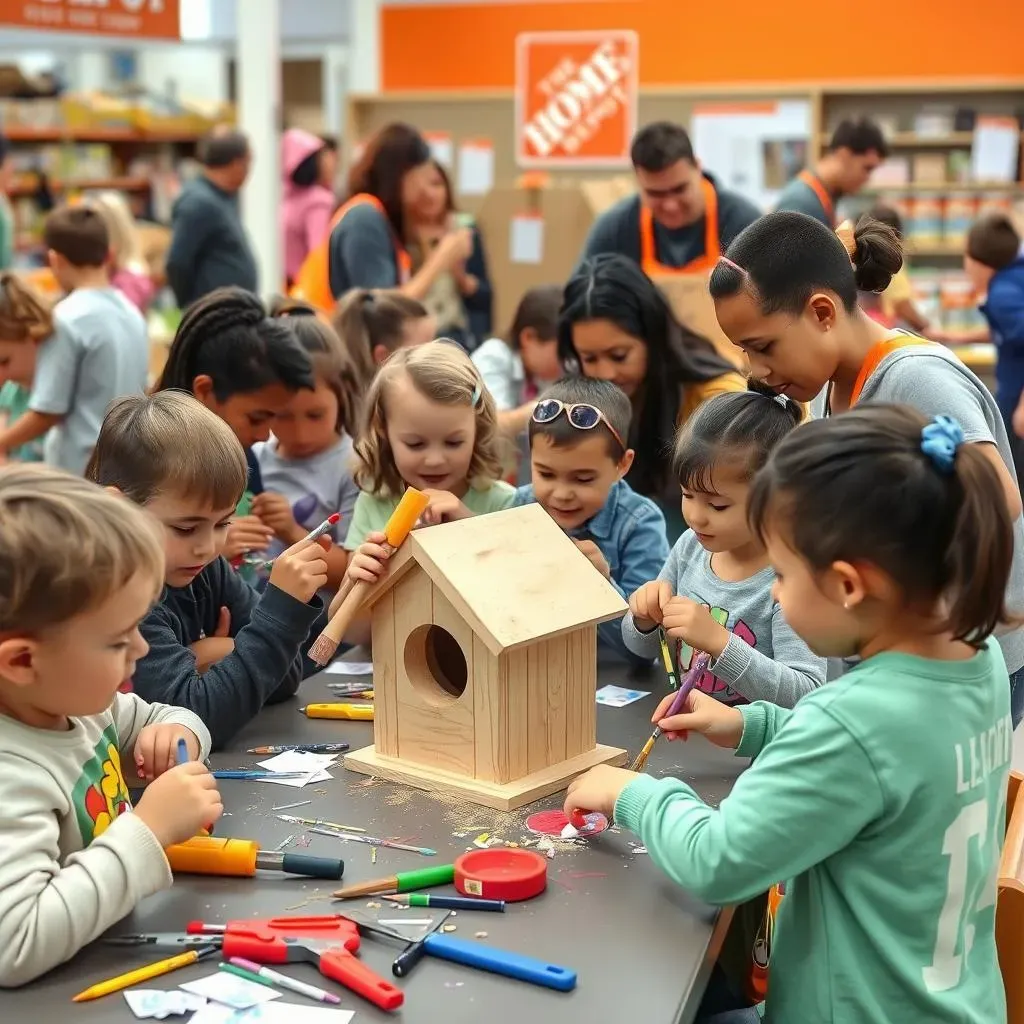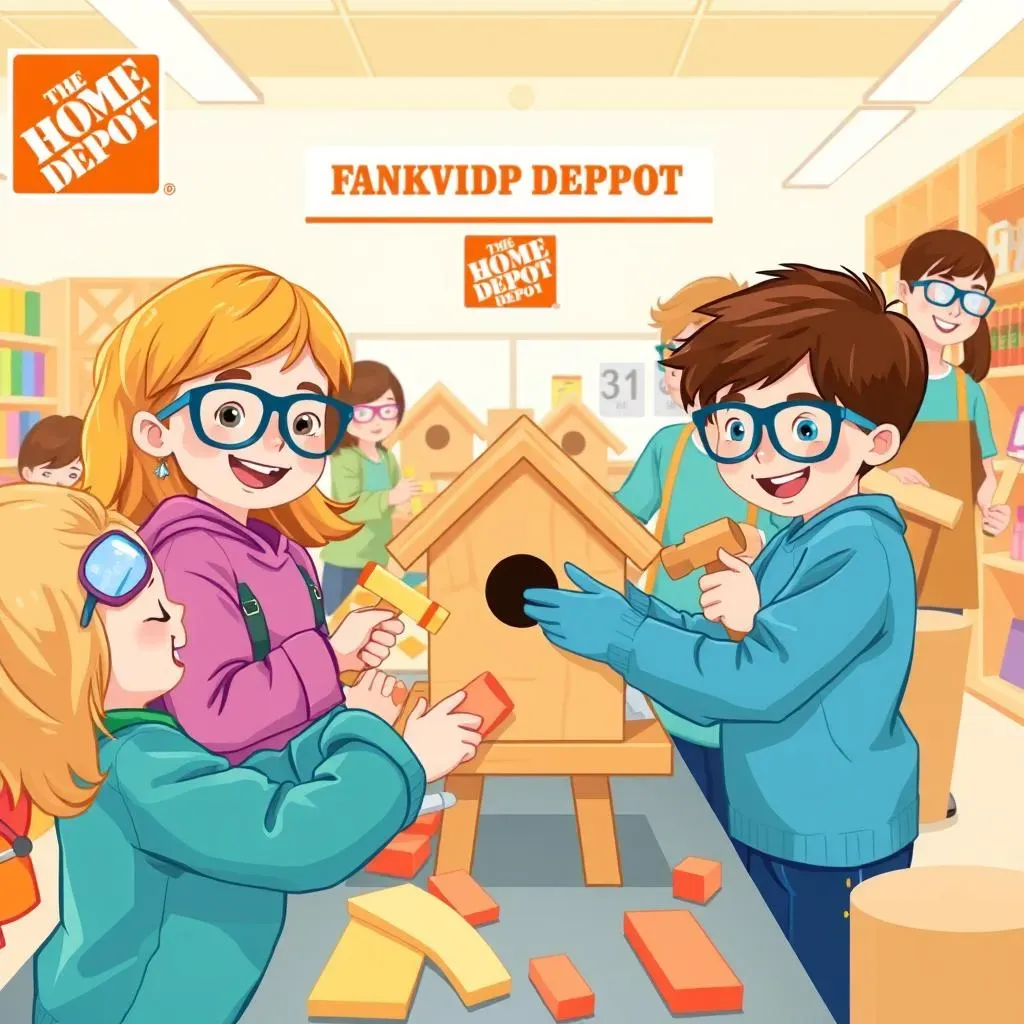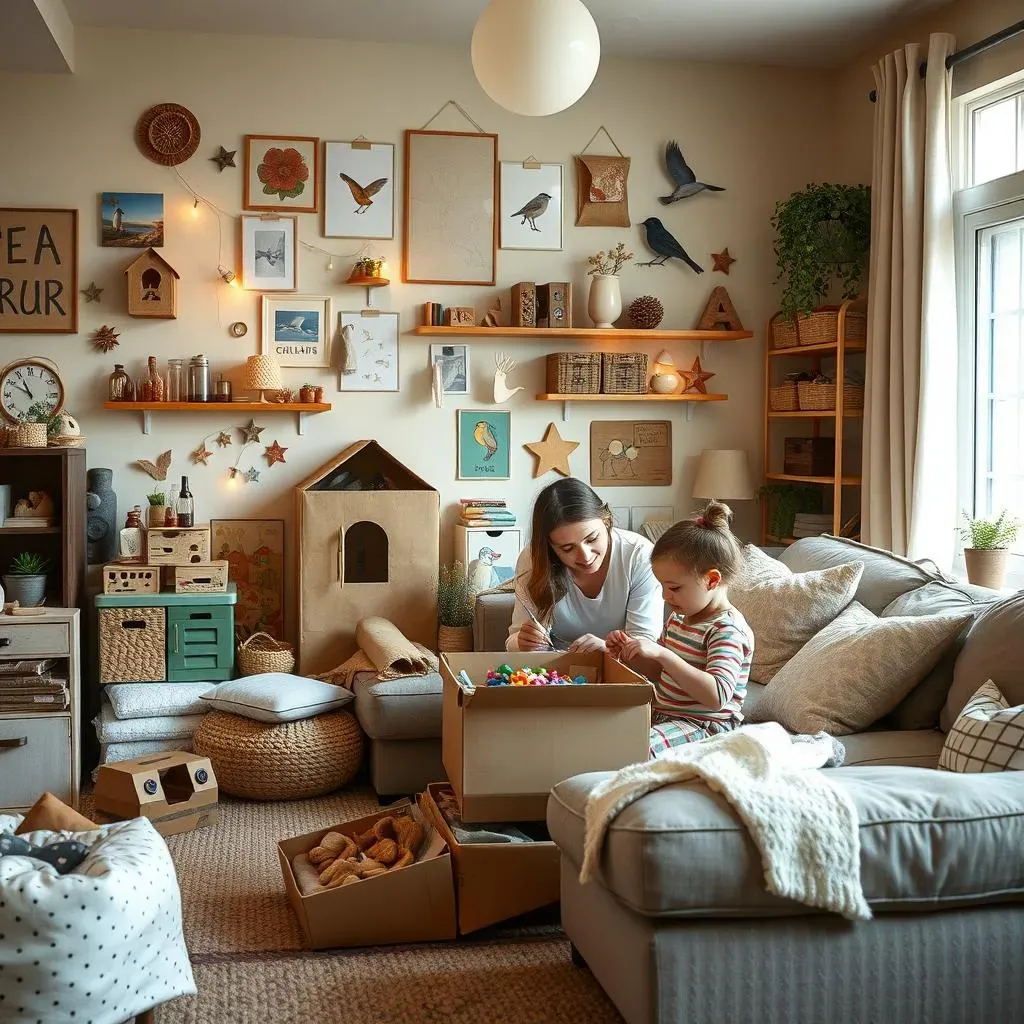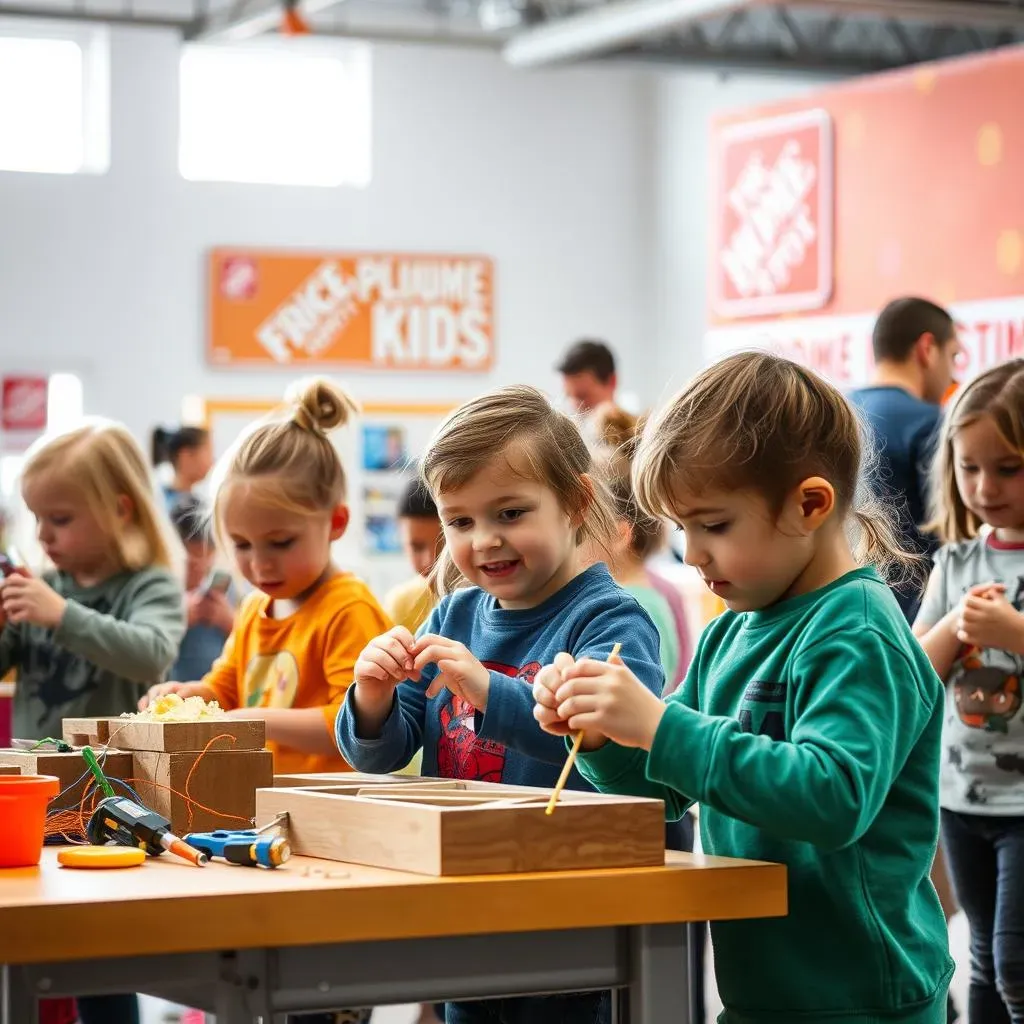Table of Contents
Ever wondered what age is Home Depot kids workshop for? You're not alone! Many parents and caregivers are curious about these free, hands-on workshops. They sound fantastic, right? A place where kids can build, create, and learn some cool DIY skills. But, are they really suitable for all ages? That’s what we’re going to explore. This article will guide you through everything you need to know about the Home Depot Kids Workshop, from the recommended age range to what you can expect during a session. We'll also discuss some fun DIY project ideas you can try at home, even if you can’t make it to a workshop. So, whether you have a toddler or a pre-teen, let's figure out if the Home Depot Kids Workshop is the right fit for your child. Get ready to discover how these workshops can spark creativity and foster a love for building!
Home Depot Kids Workshop: What Age is it Designed For?
Home Depot Kids Workshop: What Age is it Designed For?
The Official Age Range
Okay, so you're wondering, "What age is this workshop actually for?" The official line from Home Depot is that their Kids Workshops are designed for children ages 5 to 12. That's the sweet spot, the age group where they figure kids have the fine motor skills to handle the tools and the attention span to follow the instructions. I mean, let's be real, trying to get a toddler to hammer a nail straight might be more of a comedy show than a construction project. But, that's the guideline, 5 to 12.
They aim for this age range because it’s when kids start to grasp the concepts of following instructions, using tools properly, and actually creating something from start to finish. It’s a great way for them to learn practical skills, boost their problem-solving abilities, and get a real sense of accomplishment. Plus, it’s a fun way to spend a Saturday morning, away from screens and all that jazz. The workshops are free, and they provide all the tools and materials, which is a bonus for any parent.
But What About Younger Kids?
Here’s the thing, while 5 to 12 is the recommended age, they often say “all ages welcome” or something similar. So, what does that mean? Well, if you have a younger kid, say a 3 or 4-year-old, you can still bring them. You’ll just need to be more hands-on, maybe doing most of the actual building while they supervise and offer “helpful” advice. I’ve seen it happen and it can be a great bonding experience, even if it's a bit messy. It’s less about them doing it all themselves and more about introducing them to the idea of building and creating. Just be prepared to get a little sawdust on your clothes.
Age Group | Skill Level | Parental Involvement |
|---|---|---|
3-4 years | Beginner | High |
5-8 years | Intermediate | Moderate |
9-12 years | Advanced | Low |
Older Kids and Teens
What about kids older than 12? Well, officially, they’re outside the target age. But, honestly, if they're interested, why not? I mean, who doesn't love a free project and a chance to build something? They might find it a bit simple, but it could still be a fun way to spend time with younger siblings or just enjoy a creative activity. Plus, some older kids might be interested in helping out or mentoring the younger ones. It’s all about sparking a passion for DIY, no matter your age. And let's face it, sometimes even adults could use a little refresher on the basics.
HandsOn Fun: What to Expect at a Home Depot Kids Workshop
HandsOn Fun: What to Expect at a Home Depot Kids Workshop
What Happens at the Workshop
Alright, so you’ve decided to give it a go, that's awesome! Now, what exactly happens at one of these Home Depot Kids Workshops? Well, imagine a mini construction site, but way less chaotic and way more adorable. When you arrive, you'll usually find a designated area, often at the back of the store, where they set up tables and all the supplies. Each kid gets a little kit with all the wood pieces, nails or screws, and any other materials needed for that month’s project. It's like a little treasure chest of DIY goodness. They also provide small hammers, screwdrivers, and safety glasses, because safety first, right? The store associates are super helpful, guiding the kids through each step, making sure no one loses a finger, and that everyone gets their creation built as intended.
The projects are typically simple and straightforward, designed to be completed in about 30 minutes. Think things like small wooden birdhouses, toy trucks, or picture frames. They're not building skyscrapers, but they are learning the basics of measuring, assembling, and using tools, which is pretty cool. The atmosphere is usually pretty energetic, with kids hammering, screwing, and generally being proud of their work. It's a great way for kids to get some hands-on experience and feel like they’ve actually accomplished something tangible. Plus, it’s a fun way to bond with your kids and see them learn new stuff, while getting a free project out of it. Win-win, I’d say.
Workshop Element | Description |
|---|---|
Project Kits | Pre-packaged materials for each project |
Tools | Child-sized hammers, screwdrivers, and safety glasses |
Guidance | Helpful store associates to assist the kids |
Project Duration | Typically around 30 minutes |
Beyond the Building: Extra Perks
But wait, there's more! It’s not just about building something and then leaving. Most of the time, the kits come with a little bonus, like a sticker or a related STEAM activity. This is to encourage continued learning and fun at home. It’s a nice touch that extends the workshop experience beyond the store. And, of course, the kids get to keep the project they built, which is always a big hit. They get to show off their creation to family and friends, and have something tangible that they made with their own hands. It's a great way to boost their confidence and get them excited about DIY projects.
Also, these workshops aren’t just for the kids. They’re also a great opportunity for parents and caregivers to connect with their kids and see them try something new. It’s a fun, free, and educational experience that the whole family can enjoy. Plus, let’s be honest, sometimes it’s nice to have a structured activity that gets the kids out of the house for a bit. So, if you're looking for a way to spend a Saturday morning, I highly recommend checking out the Home Depot Kids Workshop. It’s more than just building, it’s about learning, creating, and making some fun memories.
Beyond the Workshop: DIY Ideas for Kids at Home
Beyond the Workshop: DIY Ideas for Kids at Home
Keeping the DIY Spirit Alive
Okay, so the Home Depot Kids Workshop was a blast, but what happens when you get home? The fun doesn't have to stop there! There are tons of awesome DIY projects you can do with your kids using simple materials you probably already have lying around. Think about it: cardboard boxes, empty toilet paper rolls, some paint, and a little imagination can go a long way. It’s all about fostering that creativity and problem-solving mindset they started at the workshop. Plus, it's a great way to keep them off screens and engaged in something constructive.
One of the easiest things to do is to create a little maker space at home. This doesn't have to be fancy, just a designated area where they can keep their crafting supplies and unfinished projects. It's like their own little invention lab! From building forts out of blankets to making paper airplanes, the possibilities are truly endless. The key is to let them lead the way, offering guidance when needed but also letting their creativity take the wheel. It's amazing what kids can come up with when given the space and freedom to explore.
Project Idea | Materials Needed | Skill Focus |
|---|---|---|
Cardboard Box Fort | Cardboard boxes, tape, markers | Spatial reasoning, problem-solving |
Toilet Paper Roll Animals | Toilet paper rolls, paint, glue, googly eyes | Creativity, fine motor skills |
Homemade Playdough | Flour, salt, water, food coloring | Sensory exploration, basic chemistry |
Simple Projects, Big Impact
Let's talk about some specific ideas. How about making a bird feeder? You can use an old plastic bottle or a milk carton, some string, and birdseed. It’s a fun way to teach kids about nature and caring for animals. Or, if you have some old jars, they can decorate them and turn them into cute pencil holders or mini terrariums. And if you have some spare pieces of wood lying around, you can build simple things like small shelves or toolboxes. These projects don’t have to be complicated, it’s really about the process of creating something with their own hands.
And don't forget about art projects! Painting, drawing, and sculpting are all great ways to unleash their creativity. You can even make your own paint using natural ingredients like berries or spices. It’s a fun way to experiment and learn about the world around them. The most important thing is to make it fun and engaging for them. It’s not about creating perfect masterpieces, it’s about fostering a love for creating and exploring new things. It’s a journey, not a destination, right?
Is the Home Depot Kids Workshop the Right Fit for Your Child's Age?
Is the Home Depot Kids Workshop the Right Fit for Your Child's Age?
Considering Your Child's Development
Alright, let's get down to brass tacks. Is the Home Depot Kids Workshop actually a good fit for your kid? It really depends on where they're at developmentally. If your child is under five, you’ll need to be super involved. They might not have the hand strength or coordination to hammer a nail straight or screw in a screw without some serious help. That's totally okay, though! It’s about introducing them to the idea of building and creating, not about them becoming master carpenters overnight. The workshops are a great starting point, but remember, it's about the experience, not perfection.
For kids in the 5-8 year range, they are usually pretty good at following instructions and can handle most of the project with some guidance. They might need a little help with the trickier parts, but they’ll also feel a real sense of accomplishment when they finish their project. And for kids 9-12, they can often do the whole thing themselves, which is awesome. They can also learn some advanced techniques and even help out the younger kids. So, it’s really about matching the workshop experience to where your child is at in their development. It's not a one-size-fits-all kind of thing.
Matching Expectations with Reality
Now, let’s talk about expectations. Sometimes, we, as parents, get a little carried away with what we think our kids should be able to do. I've been there, totally guilty! If your child is a bit younger, or maybe just not super interested in building, that’s okay. The workshop isn’t going to magically turn them into a DIY prodigy. It’s more about exposing them to new experiences, encouraging their creativity, and having some fun. So, if they spend more time playing with the hammer than actually building, don't sweat it. It’s all part of the learning process, and those moments can be just as valuable.
Also, keep in mind that these are free workshops, so they are typically quite popular. That means there might be a bit of a crowd, and kids might not get as much one-on-one attention as they would in a smaller class. So, if your child is a bit shy or gets easily overwhelmed, it might be a good idea to go with a friend or a family member for some extra support. It's all about setting the stage for success and making sure they have a positive and enjoyable experience. Remember, it's about learning and having fun, not about creating the perfect project.
Factor | Younger Kids (Under 5) | Mid-Range Kids (5-8) | Older Kids (9-12) |
|---|---|---|---|
Skill Level | Beginner | Intermediate | Advanced |
Parental Involvement | High | Moderate | Low |
Focus | Introduction to Building | Skill Development | Independent Creation |
Making the Most of the Experience
So, how do you make sure your child has a great time? First, involve them in the process before you even get to the store. Let them pick out the project they want to do. Talk about what they'll be building and what tools they’ll be using. This helps build anticipation and excitement. When you’re at the workshop, be present and engaged with your child. Offer encouragement and help when needed, but also let them take the lead. If they want to use a different color or design, let them. It’s their project, after all!
And lastly, don’t forget to celebrate their efforts! When you get home, display their creation proudly and talk about what they learned. It’s all about fostering a love for learning and creating. The Home Depot Kids Workshop is a great experience, but it's just one piece of the puzzle. It’s about building confidence, sparking creativity, and making some fun memories along the way. It's a great way to spend a Saturday morning, and it's free, which is a win-win for everyone.